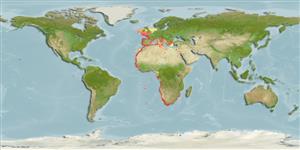Common names from other countries
Lớp phụ Cá sụn (cá mập và cá đuối) (sharks and rays) >
Rajiformes (Skates and rays) >
Rajidae (Skates)
Etymology: Rostroraja: Latin, rostrum = beak + Latin, raja, -ae = a sting ray (Ref. 45335).
More on author: Lacepède.
Environment: milieu / climate zone / depth range / distribution range
Sinh thái học
Biển gần đáy; Mức độ sâu 30 - 600 m (Ref. 6808), usually 50 - 500 m (Ref. 26999). Subtropical; 56°N - 37°S, 19°W - 23°E
Eastern Atlantic and southwest Indian Ocean (British Isles to Mozambique) and the Mediterranean Sea.
Bộ gần gũi / Khối lượng (Trọng lượng) / Age
Maturity: Lm ? range ? - ? cm
Max length : 230 cm TL con đực/không giới tính; (Ref. 11284); 202.0 cm TL (female)
Short description
Khóa để định loại | Hình thái học | Sinh trắc học
A giant skate with a broad-based, abruptly narrow-tipped snout covered with small, sharp thorns; pectoral disc angular, and no thorns on nape or back, but three rows of large thorns on tail (Ref. 5578). Larger immature and adult individuals grey with numerous small white spots above, underside white with no black pores; hatchlings plain reddish-brown above, often with blue spots, and white below with broad dusky grey margins on disc (Ref. 5578).
Inhabit shelf and slope waters (Ref. 4426). Found on sand and rock-sand bottom (Ref. 6808). A bottom-predator of bony fishes, other elasmobranchs, fish offal, crabs, shrimps, mysids, octopi, and cuttlefish (Ref. 5578). Minimum depth reported taken from Ref. 4426. Maximum length for female is 202 cm (Ref. 41333). Oviparous. Distinct pairing with embrace. Young may tend to follow large objects, such as their mother (Ref. 205). Eggs are oblong capsules with stiff pointed horns at the corners deposited in sandy or muddy flats (Ref. 205). Egg capsules are 12.5-18.3 cm long and 10.0-13.9 cm wide (Ref. 41250). About 55-156 eggs are produced per individual annually (Ref. 41250).
Life cycle and mating behavior
Maturities | Sự tái sinh sản | Spawnings | Egg(s) | Fecundities | Ấu trùng
Oviparous, paired eggs are laid. Embryos feed solely on yolk (Ref. 50449). Eggs are laid in huge cases and take up to 18 months to hatch (Ref. 5578). Distinct pairing with embrace. Young may tend to follow large objects, such as their mother (Ref. 205).
McEachran, J.D. and K.A. Dunn, 1998. Phylogenetic analysis of skates, a morphologically conservative clade of elasmobranchs (Chondrichthyes: Rajidae). Copeia 1998(2):271-290. (Ref. 27314)
IUCN Red List Status (Ref. 130435)
CITES (Ref. 128078)
Not Evaluated
Threat to humans
Traumatogenic (Ref. 5578)
Human uses
Các nghề cá: buôn bán nhỏ; cá để chơi: đúng
Các công cụ
Special reports
Download XML
Các nguồn internet
Estimates based on models
Preferred temperature (Ref.
115969): 8.8 - 17.5, mean 13.5 (based on 474 cells).
Phylogenetic diversity index (Ref.
82804): PD
50 = 1.0000 [Uniqueness, from 0.5 = low to 2.0 = high].
Bayesian length-weight: a=0.00269 (0.00232 - 0.00313), b=3.22 (3.18 - 3.26), in cm Total Length, based on LWR estimates for this species (Ref.
93245).
Mức dinh dưỡng (Ref.
69278): 4.4 ±0.83 se; based on food items.
Thích nghi nhanh (Ref.
120179): thấp, thời gian nhân đôi của chủng quần tối thiểu là 4.5 - 14 năm (Fec=55).
Fishing Vulnerability (Ref.
59153): Very high vulnerability (90 of 100).
